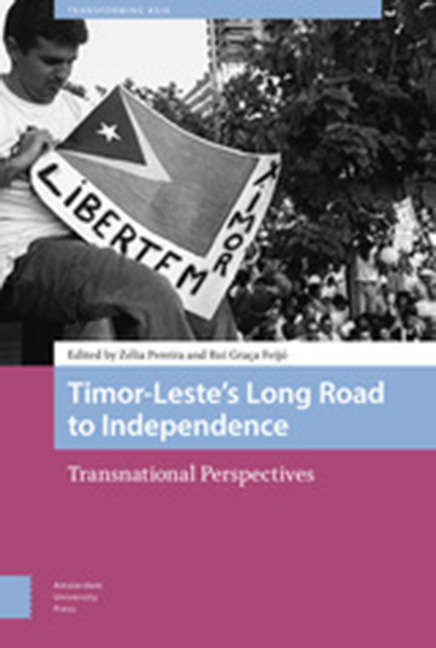Book contents
- Frontmatter
- Contents
- Acknowledgements
- A Note on the Name of the Country
- List of Figures
- Introduction: Timor-Leste’s Long Road to Independence: Outline for an Analytical Framework
- Part One Before The Portuguese Decolonisation
- Part Two The Portuguese Revolution Arrives In Timor-Leste
- Part Three Reaction To The Indonesian Invasion Of Timor-Leste
- Part Four Resisting The Indonesian Annexation Of Timor-Leste
- Index
13 - The Indonesian Genocide in Timor-Leste: Law, Politics, History
Published online by Cambridge University Press: 14 February 2024
- Frontmatter
- Contents
- Acknowledgements
- A Note on the Name of the Country
- List of Figures
- Introduction: Timor-Leste’s Long Road to Independence: Outline for an Analytical Framework
- Part One Before The Portuguese Decolonisation
- Part Two The Portuguese Revolution Arrives In Timor-Leste
- Part Three Reaction To The Indonesian Invasion Of Timor-Leste
- Part Four Resisting The Indonesian Annexation Of Timor-Leste
- Index
Summary
Abstract
This chapter examines Indonesia's actions against the people of Timor- Leste between 1975 and 1999. Its focus is the applicability of the 1948 Genocide Convention to Indonesia's conduct. It begins by discussing the evidentiary standard by which Indonesia's conduct should be judged. It then shows that the East Timorese were a national group within the meaning of the Genocide Convention. It cites the findings of Timor-Leste’s Truth Commission and other official and scholarly studies to demonstrate Indonesia's long-running and systematic effort to undermine the foundation of the East Timorese as a national group. It concludes with a discussion of responsibility, accountabiity and justice.
Keywords: genocide, crimes against humanity, war crimes, national group, International Criminal Tribunal
Genocide: Law, Standards and Evidence
The 1948 Genocide Convention defines genocide as “any of the following acts committed with intent to destroy, in whole or in part, a national, ethnical, racial or religious group, as such:
(a) Killing members of the group;
(b) Causing serious bodily or mental harm to members of the group;
(c) Deliberately inflicting on the group conditions of life calculated to bring about its physical destruction in whole or in part;
(d) Imposing measures intended to prevent births within the group;
(e) Forcibly transferring children of the group to another group. (UN 1948)
Indonesia invaded Timor-Leste in 1975 and withdrew in 1999. Numerous official, scholarly and eyewitness inquiries have confirmed that Indonesian authorities committed all five acts listed above (Job 2021; Job 2018; Waddingham 2016; Staveteig 2007; CAVR 2005; Nevins 2005; UN 2005; Fernandes 2011; KPP-HAM 2000; ETISC 1999; ETISC 1997; Sissons 1997; Jardine 1995; Defert 1992; Dunn 1983; Komitee Oost Timor 1980; Walsh and Munster 1980; Kohen and Quance 1980; Levey 1980; Chomsky 1979; Kohen 1977). The core question of this study is whether Indonesia's actions against the people of Timor-Leste amount to genocide. This question has never been tested at an international criminal tribunal. Indonesia has shielded its own personnel from prosecution, and the international community has facilitated their impunity. This barrier to justice is also a barrier to truth, since the genocidal intent of the perpetrators cannot be determined from their operational and planning records, or by their admissions under cross-examination. But the matter need not rest there.
This study is a non-judicial inquiry into Indonesia's conduct. It adopts a “reasonable grounds” standard to establish the facts and circumstances of mass atrocities.
- Type
- Chapter
- Information
- Timor-Leste's Long Road to IndependenceTransnational Perspectives, pp. 375 - 394Publisher: Amsterdam University PressPrint publication year: 2023

